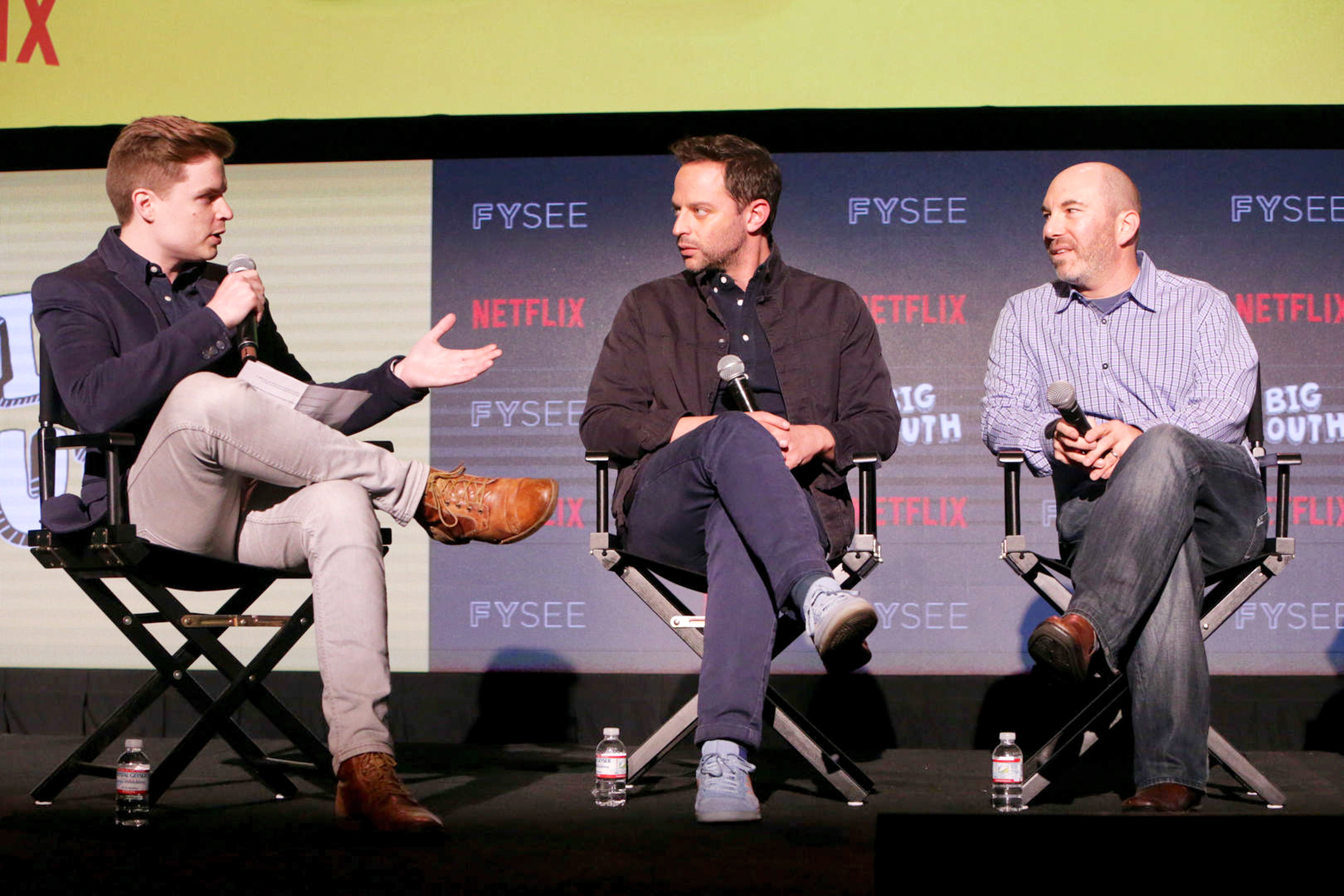From city council meetings to the red carpet

Iowa alumnus Ben Travers speaks with Nick Kroll (middle) and Andrew Goldberg (right), creators of the show Big Mouth, during a For Your Consideration (FYC) panel in Los Angeles in May 2018.
Ben Travers has worked the red carpet, covering the Emmys, parties, and premieres to interview some of the biggest stars in the entertainment galaxy. But he says that without having served in a much less glamorous role—covering city council meetings as a student journalist for The Daily Iowan—he might not be a successful critic working in Hollywood today.
Travers, a 2009 University of Iowa graduate, is a TV critic and deputy editor for IndieWire, an online publication that covers film, TV, and reviews geared toward everyday fans as well as industry insiders. He’s been invited to the sets of shows and to a few celebrities’ homes, and speaks regularly with directors and writers of top TV shows.
But he got his start as a writer a long way from Hollywood. Growing up in Odell, Illinois, a village near Bloomington-Normal, Travers lived 45 minutes from the nearest movie theater. Each time he saw a movie, he’d come home and start writing.
“I’d write little reviews to try to sort out what I thought about it,” he says. “I grew up writing as much as I could. It gave me a sense of perspective and helped me understand things more than if I were talking them through.”
“As soon as I got to Iowa, I was already impressed with the School of Journalism and Mass Communication. But it had a feeling of home, like a really comforting, welcoming place to be. I remember on the visit, I said, ‘This is where I’m going to end up going.’ It had the right blueprint for what I had in mind, but it was also an instinctive feeling.”
Travers wrote for his high school newspaper, and when it was time to choose a college, he wanted to find a school with a strong journalism program and “something related to entertainment and how to make it.”
“As soon as I got to Iowa, I was already impressed with the School of Journalism and Mass Communication,” he says. “But it had a feeling of home, like a really comforting, welcoming place to be. I remember on the visit, I said, ‘This is where I’m going to end up going.’ It had the right blueprint for what I had in mind, but it was also an instinctive feeling.”
In his first year at Iowa, Travers worked as a videographer for The Daily Iowan, gaining experience in both reporting and video production and editing. As a junior and senior, Travers covered different beats, which led him to report on Coralville City Council meetings during the historic flood of 2008.
In addition to teaching students about journalism, Iowa’s School of Journalism and Mass Communication requires its majors to complete a substantial emphasis in another discipline, which adds depth to their professional skills and broadens options for employment.
“I had to learn what was the most important issue, and how to prioritize my time, whether that meant choosing between sandbagging at some apartments or getting a story from the people who’d just gone through it,” he says. “It was definitely a formative experience.”
During his senior year, Travers took a course on criticism and the arts with Don McLeese—formerly a pop-music critic for the Chicago Sun-Times and Rolling Stone. Travers gained experience writing reviews and essays, as well as an understanding that criticism involved more than just reviewers’ personal taste.
“He gave us a sense of how, instead of just writing your opinion, you’re spotlighting different voices, finding new ways into a story, and looking at things through a certain lens,” Travers says. “I saw him as somebody who had lived it, and that helped me see a realistic path from college to the profession at a time when it’s often hard to do that.”
After graduating in 2009 with a double major in cinema and journalism and mass communication, Travers moved with a friend to St. Louis and started contributing reviews to the entertainment site PopMatters. He wasn’t paid for his work, but he became an associate editor, then editor, all the while building up a body of work that helped him land a summer internship with IndieWire in New York in 2013. He was hired as an associate TV editor in 2014, and—compared to his earlier days of submitting work from afar—Travers was now in LA learning to approach celebrities for quotes, discovering which PR representatives could help get him access to certain stars, and going to Emmys night after-parties to get reactions from nominees or award winners.

One of Ben Travers’ proudest accomplishments is launching Consider This, a column that spotlights directors, actors, and others in the industry in the months leading up to Emmys night. The regular feature reflects a personal goal, as well as that of the company that owns IndieWire, to diversify and increase representation, both in hiring and in coverage.
“Covering Emmy season really involves a lot of advocacy, as we try to spotlight as many different artists we can find who are exciting to us, Travers says. “It’s a way of saying, ‘This person has made something worthwhile,’ and expanding the conversation, not just focusing on the same people who get highlighted every year. That means steering focus to a variety of different people in an effort to make sure Hollywood’s horrific track record of discrimination is not going to continue. We want to highlight people of color and all minorities—who have a job in a place that doesn’t make it easy on them.”
While it may not seem like an obvious line from covering city council meetings to covering the red carpet, Travers says, “Looking back, it’s pretty clear that a lot of my introductory experiences at Iowa were fundamental, with all the deadlines, on-the-ground experience, and learning a plethora of different areas of journalism.
“Going to council meetings, picking apart the notes and trying to parse out the most important information, made me more able to do the research components I do now, like look through press releases and the dense articles that are required to understand things on the business side,” he continues. “A Journalism and Law class was extremely valuable in making me aware of ways to keep from getting yourself in trouble with people and courts. All of that was really important to me.”
Travers would advise aspiring critics to remember that when writing about those in the entertainment industry, their subjects are real human beings.
“You want to focus your critique in a way that’s respectful,” Travers says. “You don’t need to go after someone to make your point.”
When advocating for a show or performance—or perhaps, more importantly, when critiquing it—Travers says he has also grown in terms of understanding his purpose.
“One of the most important things when you’re trying to develop a critical voice is recognizing perspective and intention,” he says. “When I started, my thinking was that I would craft an argument so well, and make it so sound and thorough, that you won’t be able to argue against it, and I’d get people to agree with me. While there is a benefit to knowing how to craft a good argument, it’s not about trying to bully someone into something and tell them why they’re wrong. You’re trying to invite a conversation.”




